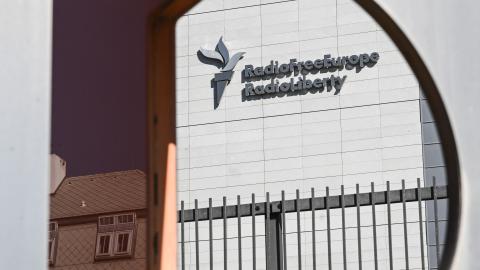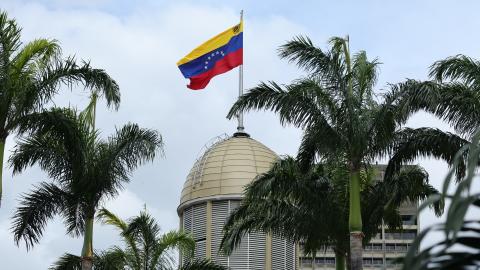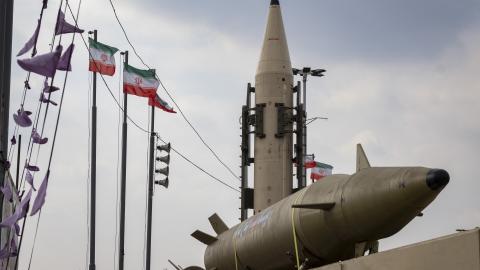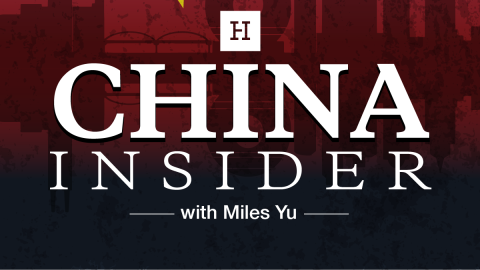In this week’s episode of China Insider, Miles Yu unpacks President Donald Trump’s recent visit to the Middle East and the implications for United States–China strategic competition in the region. Second, we discuss the politics of rare earth minerals (REM), and how the US and its allies can formulate strategies to counter China’s stranglehold on REM procurement and refinement. Lastly, Miles provides his analysis of the latest changes to US tariffs and trade policy toward China regarding the de minimis threshold and impact on US-China e-commerce competition.
China Insider is a weekly podcast project from Hudson Institute’s China Center, hosted by China Center Director and Senior Fellow, Dr. Miles Yu, who provides weekly news that mainstream American outlets often miss, as well as in-depth commentary and analysis on the China challenge and the free world’s future.
Episode Transcript
This transcription is automatically generated and edited lightly for accuracy. Please excuse any errors.
Miles Yu:
Welcome to China Insider, a podcast from the Hudson Institute's China Center. I am Miles Yu, senior fellow and director of the China Center. Join me each week for our analysis of the major events concerning China, China threat and their implications to the US and beyond.
Colin Tessier-Kay:
It is Tuesday, May 20th, and we have three topics this week. First, we review President Trump's Middle East tour in the context of US China's strategic competition for regional influence. Second, we discussed the politics of rare earth minerals (REM), and examine China's strategy for cornering the global procurement and development of REM infrastructure. Third, we visit the US-China e-commerce competition as Congress considers a potential de minimis ban on select Chinese goods. Miles, great to be with you again this week.
Miles Yu:
Colin, glad to be with you again.
Colin Tessier-Kay:
First up this week, President Trump embarked on a four-day tour of the Middle East with stops in Saudi Arabia, Qatar, and the United Arab Emirates. In addition to holding bilateral talks with several countries in Riyadh, Trump announced other developments concerning US foreign policy, in particular regarding Syria and Iran, with hopes for a potential nuclear deal as well as additional investment talks with other Middle East leaders. Miles, what did we learn from the president's trip last week and what did these visits achieve?
Miles Yu:
Actually, the achievements are very obvious. I think this – mind you - this is the first formal state visit by President Trump during his second term, and he chose the Middle East as his first stop. It shows how important the Middle East is to America's national interest. And so physically - you can say materially -the achievement is very outstanding. And he secured a pledge of a massive investment from the three very rich Gulf countries, Saudi Arabia, Qatar, and the UAE, and I think it's close to $2 trillion. And also he secured a lot of orders for American arms. The massive arms deals with Saudi Arabia alone is over $100 billion dollars. This is the largest arms sale ever and in Qatar and the government of Qatar decides to order something like close to $100 billion dollars worth of Boeing aircraft. That's a big win for American industry. So on the other front, I think one of the most interesting diplomatic accomplishments is the anti-Iran coalition building and by promoting Sunni Arab unity against the Iranian interference, this is very, very important.
And of course, he also helped lay the political groundwork for UAE-Israel normalization. And this is one of the critical links of the Middle Eastern peace, the continuation of the historic Abraham Accords trend. And of course there's always a counter-terrorism cooperation, but I will say probably the most important thing is about China. China has made tremendous inroads during the four year absence of Trump in the White House. China has sort of accosted Saudi Arabia and Qatar and basically they were in China's political orbit for a while. And of course, not only Chinese active movements in that ground, but also America pushed those countries away from us and pushed closer to the Chinese political orbit. I think President Trump's visit changed that direction and basically the Middle East is no longer a Chinese playground anymore. So I think it was during this visit, President Trump also made a lot of announcements about China's global outreach, about Ukraine, about several other places too. So I think it's very significant.
Colin Tessier-Kay:
And keeping with this tie into China, at least in the conversation here, I'd like to ask more about how this trip influences US-China strategic competition in the region. In the past few years, China has made significant strategic inroads in Middle East politics and has attempted to assert regional influence primarily through economic and political channels. Beijing has invested heavily in both the financial and technological development of several Gulf countries, and has sought to establish robust reliance structures that place China in a position of strategic advantage over the US and regional politics. So Miles, what does Trump's visit to the Middle East signal to China here and how does this shape US-China strategic competition in the region?
Miles Yu:
Well, China's relationship with the Gulf countries, particularly Saudi Arabia, is to try to diminish America's traditional inference in that part of the world, particularly this oil for UN deal. Basically, China wants to replace the US dollar as a settlement of all the trade transactions between the Gulf, Sunni Arab states and China. And China almost made it. I mean, I think President Trump basically said, “hey, listen, there's no way,” and I think this is probably put an end to that deal. Plus the yuan is not nearly as popular as the dollar in any parts of the world, but China is pushing that really hard. Secondly, very significantly, it was during his visit to the Gulf States, President Trump make this a pretty big announcement, which is kind of a doctrinal change in my view. That is he basically told Allies and all the countries in the world that if you adopt Chinese 5G technology or deepen any technical tech ties with China, particularly Huawei's technologies, then you are not going to do business with the United States, that is a very powerful secondary sanction move.
And I think the world took a notice on that. And of course, through the massive arms deals with these three Gulf States, President Trump reinforced the US military industrial presence in that area. And basically, from a security point of view, the United States is much closer to the Gulf States. Bear in mind, US has a very deep interest in that part of the world. From a geopolitical point of view, Qatar hosts America’s central command, and we have our sixth fleet in that part of the world. So in other words, it is very important and we cannot lose that part of the world from geopolitical point of view in a global competition with China.
Colin Tessier-Kay:
And kind of building off that, and zooming out for a moment here with the slate of negotiations and foundations for future deals resulting from these high-level talks, would it be at all accurate to characterize this as a nascent formation of a Trump Doctrine, at least in so far as the current administration's foreign policy objectives and with application to current Middle East relations and regional politics?
Miles Yu:
There are many ways to interpret what the Trump Doctrine might be. In my view is that one of the core elements of the Trump Doctrine is this secondary sanction strategy that is we designate China as our primary and most important threat to our national security during Trump's first term. But it's very hard to implement that into policy because we have friends and allies who basically try to be neutral and do not want to take side between us and China. And so the second term, and I think President Trump learned from his lessons in dealing with Iran during the first term, for example, this is a whole deal about the JCPOA withdrawal during the first Trump term. And we told friends and allies, mostly those people involved in that deal, the French, the British, and Germans and Chinese, well, if you want to deal with Iran after US pullout, you are not dealing with the United States period.
So that forced the French, the British, the German, and Chinese to divest from Iranians. So this is very, very important. So when President Trump makes this announcement that anybody who buys oil from Venezuela, anybody who buys oil from Iran, you are not going to have any business with the United States. That's a very powerful doctrinal change. And I think that's probably one of the most important elements of the Trump Doctrine in my view. And I think that, also, the secondary sanction is very effective. That probably is the foundation for President Trump's very effective and earth shattering global reciprocal tariffs.
Colin Tessier-Kay:
Let's shift to our next topic today, rare earth minerals or REM. For our listeners unfamiliar with the topic, rare earth minerals have become a principle focus of most every country's national security policy over the past couple of decades, and especially as China, over that same period, has managed to corner a substantial percentage of the procurement and development markets involving REMs. Briefly, REMs are a subset of the critical minerals umbrella and comprise a group of 17 elements, specifically from a larger group of 50 critical minerals that the US Geological Survey identifies as critical to both the US economy and national security. So Miles, can you walk us through some more of the background here on rare earth's and how China currently fits into the equation?
Miles Yu:
Well, rare earth elements are critical for electronics industry, for renewable energy industry, for defense industry, and for industrial applications as a whole. So without rare earth I think it will have a major problem. China since the 1980s saw this indispensable role of rare earth elements. So they made the national policy to not only sort of discover and explore the rare earth elements, but also most importantly processing them. So that's why China has developed a near monopoly on all this and they use this as a weapon, as a stranglehold. When they had a problem with Japan some 10, 15 years ago, they basically stopped all the exports of the rare earth materials to Japan now make Japanese very, very nervous and panic in certain sense. So China basically is now enjoying the virtual monopoly of rare earth elements, not only just the ore, but also processing. And through massive state subsidies and environmental laxity, there's virtually no environmental regulation on that. Now, extracting rare earth elements is extremely toxic. And also those involve a lot of radioactive chemical elements that basically have destroyed China's ecosystem in the area where these processing plants are located. You go to inner Mongolia in China, huge part of the inner Mongolia in China where earth extracting and processing take place is destroyed. The ecosystem is gone. So they have the strategic leverage against the world.
Colin Tessier-Kay:
Yeah, and some additional context here, like you mentioned, China is the world's largest producer currently still of REMs in metric tonnage by a vast margin, clocking in at - most recently - at 270,000 tons with the US, Myanmar, and Australia as the runners up at 45,000, 31,000 and 13,000 tons, respectively. Given these discrepancies Miles, what exactly is China's calculus here and what makes these minerals so rare to begin with?
Miles Yu:
Well, the rare earth elements, the ores are not really rare, but most of this stuff is not economically viable because the density of the rare earth ores, it varies. So China basically does not have the environmental concern as nearly as the rest of the world. So this is extremely environmentally damaging to extract and refine those products. So they have a lot of toxic waste, as I say. So the Chinese calculation is this is that they basically want to create a monopoly to blackmail the world, if you will, because much of the industry of the world rely on the rare earth. And to break that, of course the United States has realized we have to break that. And President Trump has issued Executive Orders, several of them, to reduce dependency on China, particularly to support domestic mining project. There is one in California called Mountain Pass, that's a big one, and I heard there's potential in Utah and Nevada - they'll fund that.
And also through coordination with allies - you mentioned about Australia - Canada also play a very important role in this, too. So Australia and Canada catching up to China's production volume will basically diffuse the virtual monopoly China holds. Now, we do have this sort of national legal authority in the Defense Production Act, and I think President Trump has authorized the American government to use that Defense Production Act to invest in critical minerals, including rare earth. This is also part of the negotiation with the Ukraine, for example. And I think we signed a deal agreement with the Ukrainian government. And the most important part of that deal, the critical part of that deal is Ukrainians supplied the US with rare earth minerals.
Colin Tessier-Kay:
Moving to our final topic this week, following trade negotiations between Washington and Beijing last week, the Trump administration announced it would cut tariffs on low value imports and goods from China to 54% down from 120%. In an Executive Order last Monday, President Trump ordered a reduction in the de minimis tariff on shipments from China, including Hong Kong. Miles, do you mind explaining what is the de minimis in US tax law here, and how does it apply necessarily to the US-China trade war?
Miles Yu:
Well the de minimis clause deals with the threshold of goods imported to the United States. If any items that value $800 and less, then you'll be tariff free. So this will be a very, very good for the Chinese e-commerce, which dominates Americans. E-commerce - go to amazon.com - I mean, most of the stores on amazon.com are based in China. So for years, years this e-commerce has benefited tremendously from this loophole. And so your tax free, tariff free, this is also significant for the Chinese economy because the Chinese economy is going downhill near the bottom. Right now, the consumer confidence is really low. The trade deal, trade volume overall with the United States is down. And of course there's no more foreign directly investment. FDI is down, nobody would like to put money into the Chinese market right now - no sane person, actually. So one of the few areas where it is thriving is this e-commerce with the United States. And they were doing that. They were able to do that mostly because of de minimis clause. That is, they were able to get with items under $800 that will be tariff free. So now the US government is revoking that de minimis privilege for China. So everything has to be tariffed and that's basically is what's going on.
Colin Tessier-Kay:
Back in December, the US-China Economic and Security Review Commission recommended Congress eliminate the de minimis eligibility for imports sold through online marketplaces. And following up on that kind of thread this past Tuesday, the House Ways and Means Committee approved the tax bill, which includes a provision that would permanently end de minimis for commercial shipments from all countries by July, 2027. So it seems like China per usual is the principle focus in these trade policy developments. So Miles, let me ask, what explains the stiff rise and drop of the current de minimis tariff on China? First from 0% to 120% and now back to 54% - which I should clarify includes the base and fentanyl rates - and how exactly will this impact US-China e-commerce competition?
Miles Yu:
This will impact US-China trade in a very positive way from our perspective because the Chinese, basically they're dumping these very cheap products in the United States, driving off the American competition and become dominant. Even if without 30 to 54% tariffs, the Chinese good will still be cheap in comparison. So in China, if you look at the e-commerce, China realized this is a bonanza. So they basically keep selling more and more cheap dumping goods to the American market not only Amazon, but also through their own companies like Shein and Temu and Ali Express. Those were e-commerce giants based in China, and then their prices were a fraction of what American products would be. So that's one of the reasons why even if it's 4%, we still have the China - we still have the price advantage - and I think the tariff, I expect it could go up. So the whole idea is to make the cost of trading with the United States more equitable and to protect the American domestic market. And for those American companies who cry about this consumer price increase because of the revocation of the de minimis tariff clause privilege - I mean, it's nonsense. Most of the Chinese goods imported to this country, they're cheap, but also they're discretionary. You don't have to buy them in bulk. You can just, as President Trump said, he told the Walmart company eat the tariffs.
Colin Tessier-Kay:
Well, we've unfortunately reached our time for today, but Miles, thank you for another great conversation and contributing your expertise to these critical issues. We'll check back with you again next week!
Miles Yu:
Alright, looking forward to next week! Thank you.















